Top 9 marketing skills you need this year

Marketing has changed more in the last two decades than it did in the 75 years prior, primarily due advent of the internet. In Seth Godin’s This Is Marketing, he notes:
The internet is the first medium that wasn’t invented to make marketers happy. Television was invented to hold TV ads, and radio was invented to give radio ads a place to live.
The online world wasn’t conceived to push products, but rather exchange information.
This is what makes “disruption” more than a buzzword – it is the relatively new practice of getting out in front of potential customers by (nearly) any means necessary. This is the evolving, attention-seeking and easily-distracted world prospective new marketer managers are entering into.
At the best of times, it is dizzying. Without the right skill set and know-how, it borders upon incomprehensible.
So what new skills do successful marketers require today? We’ve narrowed down the top 9 marketing skills that are in high demand.
1. Customer experience design
No matter what industry you're in, customer experience has probably become a serious focus for your organisation.
That's because customers are savvy about the quality of your web presence and how easy or hard it is to interact with. Your overloaded WordPress site may be low cost, but it can cost you much more in the long run.
You may not need to become a technical wizard. But marketers who have a basic understanding of coding languages like HTML and CSS, and who can think critically about user experience and conversion rate optimisation, will stand out.
2. Data analytics
To grasp the overall effectiveness of any marketing campaign, you must be fluent in the intricate language of data. This is not the most jazzy aspect of marketing, but it should be considered an essential for career marketers who aren’t afraid to get their hands dirty.
In the modern marketing ecosystem, where the array of platforms and ways of measuring “conversion” are increasingly varied, it is crucial how you interpret the data. Think of it like a compass to an explorer.
Different content “hits” on different platforms, and in some cases persistence pays, but in others it may be best to abandon ship. Marketing or content analytics can help you judge the performance of a particular campaign using measurements like return on investment (ROI), marketing attribution and overall effectiveness.
The Xs and Os of data analysis a core part of RMIT Online’s Graduate Certificate in Digital Marketing Leadership.
3. Responsive design
Marketing has revolved around screens for some time, but the variety of screens has grown exponentially in the last two decades.
This has meant the practicality of how your campaigns, banners and advertisements will be viewed is a more complicated consideration.
Without the proper training or technology, it can be a near impossible “trial and error” process. But with it, a campaign has the chance to flourish on any browser.
4. Copywriting
Copywriting is different to content creation as it's designed to sell. Strong copywriting can take anything from an email marketing campaign to a LinkedIn post and transform it into a way to attract potential customers.
Of course, not everyone in marketing has to be Don Draper or Peggy Olsen, but it helps to at least have basic copywriting skills if you are entering the industry.
The good news is, there are plenty of formulas and templates available online if you need a kickstart. For example, HubSpot's article about Bob Stone's seven step formula to writing copy that converts.
5. Social media
Reputation has become a major focus for many businesses, and social media plays a critical part.
Not only does social media provide a platform for your brand's voice to be heard in more ways than ever, but it also can be a powerful tool to create communities around your brand.
As a marketer, you will need to have a sharp eye for delivering content that resonates with your target audience across channels. But more than that, social media marketing is also a chance to experiment with new opportunities, platforms and marketing tools.
6. Contextual marketing
The most successful marketers are those that alter their message and approach to suit the brand and moment.
In buzzword terms, this is called contextual marketing. To create and commission successful campaigns, marketing teams must be able to consistently gauge the temperature of the room and tap into the zeitgeist.
Infamous examples of campaigns gone wrong are Pepsi’s tone-deaf Kendall Jenner “Live for Now” campaign, Kenneth Cole attempting to “newsjack” events during the Arab Spring with this tweet, and Dove’s “whitewashing” Facebook fail.
Those three brands have since recovered, but all endured a considerable amount of reputational damage. On the other hand, Always’ “Like a Girl” campaign drew worldwide acclaim for its willingness to tackle taboo and Proctor & Gamble’s “Thank You, Mum” campaign.
7. Search engine optimisation (SEO)
Search engine optimisation (SEO) may not give you quick results like paid search (PPC), but it remains vital to the success of your digital marketing.
It’s now standard for marketers to brief writers with reference to SEO requirements, such as magic words to include, ramp up and repeat in headers and meta descriptions. This replaces yesteryear’s more clumsy technique of shoe-horning them in at the last minute.
Search engines have become more sophisticated over the years, embracing “latent semantic analysis” to relate words, which uses machine learning. In short, this means Google search and the SEO landscape you prepared for in 2015 won’t reflect the terrain of 2022.
RMIT Online’s Master of Marketing will give you the frameworks you need to get started.
8. Adaptability
Data is everywhere - whether it's via Google Analytics, social listening, your content management system or other marketing tools.
But data isn't enough if you can't respond to it. With the climate, platform and parameters changing daily, you have to always be open to tearing pages from your playbook and embracing new systems.
As an aspiring manager, you must keep your mind fresh and your thoughts free of past biases. In this way, learning can be as important as “unlearning” in the marketing world. To work on this soft skill, focus on your philosophy as much as you do about the practical.
9. Brand storytelling
The mention of “storytelling” may sound like a throwback term, but in reality the current iteration as a marketing technique is a relatively new phenomenon.
This is in an attempt to “humanise” brands, and replace catchphrase ingrained ideas with tangible emotional connection. You can see this in the recent “Wander” campaign by Tourism Victoria, which was subsequently screened alongside the trailers in independent cinemas.
In essence, it is selling an emotion rather than an idea. In a space such as tourism, this is a popular technique. Big tech has also been a pioneer in this space, seen in Apple’s “Underdogs at Work” campaign as well as Amazon’s “Alexa Loses Her Voice” Super Bowl advertisement.
For marketing purists, this development is a particularly hopeful one. Romantics would cite this as evidence that modern marketing is growing a heart.
"People don't want what you make,” writes Seth Godin in Purple Cow: Transform Your Business by Being Remarkable. “They want the way it will make them feel, and there aren't that many feelings to choose from."
How can I learn these top skills?
Two major marketing programs you can study from RMIT Online are the Graduate Certificate of Digital Marketing Leadership and the Master of Marketing.
RMIT Online’s Master of Marketing will help marketers who want the fundamental marketing skills to certify their marketing experience or to sharpen their abilities on the job.
You’ll gain an in-depth understanding of how to design marketing strategies to solve business problems and deliver fast results, and you’ll gain the critical marketing principles to stay relevant..
RMIT Online’s Graduate Certificate in Digital Marketing Leadership will prepare experienced marketers who want to plan and implement digital transformation in their marketing department.
You will learn how to select marketing technology, connect data systems and implement strategic partnerships – all so you can drive greater customer value.
We broke down the differences between the two programs below.
Choose your marketing path with RMIT Online's Master of Marketing and RMIT Online's Graduate Certificate of Digital Marketing Leadership.






